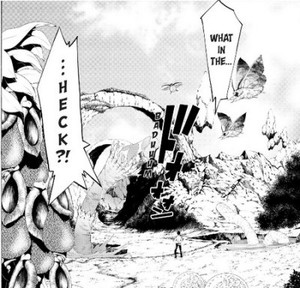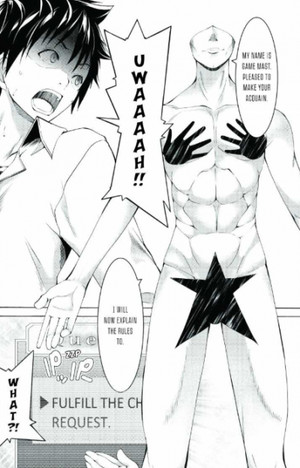The Spring 2019 Manga Guide
I'm Standing On A Million Lives
What's It About?
 After staying late in class to justify his not having applied to high schools, a young teenager named Yusuke is suddenly transported to a fantasy world, along with two of his classmates. He and his peers are then assigned roleplaying classes by a bizarre half-faced avatar, and asked to complete a quest in fourteen days. After some grief and strain (and more than a few deaths and respawns), they succeed, and are teleported back to reality. And so a bizarre cycle of maintaining a double-life while awaiting the call of this strange being and his strange game begins. The good news for Yusuke is that it's the most entertained he's been in years. He hates his life in the big city, hates the people who surround him, and finds the heroic fantasy of the alternate world an excuse to demonstrate prowess and potential he never had in the real world. Either way, the game is afoot, and the adventuring party must use all their strategy and abilities to beat it.
After staying late in class to justify his not having applied to high schools, a young teenager named Yusuke is suddenly transported to a fantasy world, along with two of his classmates. He and his peers are then assigned roleplaying classes by a bizarre half-faced avatar, and asked to complete a quest in fourteen days. After some grief and strain (and more than a few deaths and respawns), they succeed, and are teleported back to reality. And so a bizarre cycle of maintaining a double-life while awaiting the call of this strange being and his strange game begins. The good news for Yusuke is that it's the most entertained he's been in years. He hates his life in the big city, hates the people who surround him, and finds the heroic fantasy of the alternate world an excuse to demonstrate prowess and potential he never had in the real world. Either way, the game is afoot, and the adventuring party must use all their strategy and abilities to beat it.I'm Standing on a Million Lives is an original manga series written by Naoki Yamakawa and illustrated by Akinari Nao. It is published by Kodansha, retailing for $10.99 physically and digitally.
Is It Worth Reading?

Rebecca Silverman
Rating: 1.5
I'm Standing on a Million Lives' first volume appears to pick small pieces from other, similar stories and fasten them together with some old scotch tape. It's kind of like one of those old ransom notes made from cut-out letters, and if you deliver the goods to the specified location, perhaps you'll be rewarded with a better, more coherent story. Maybe that'll even happen in volume two; all that I can say for certain is that this book isn't all that great.
The premise is simple enough, and certainly one that we've seen done before (better) in titles like BTOOM and Real Account: three (later four) teens from the regular world are transported to a game-like world where they must complete quests. They've apparently been chosen by someone for this dubious honor, and as long as at least one of them stays alive in-game and they manage to complete the quest in the specified amount of time, they'll be returned to reality just fine. That they'll have to do it ten times and each time adds another party member is a neat addition to the concept, because it ostensibly means that they'll have better chances of survival with more difficult quests, but it really may end up being about how more party members = less chance of getting along. They can also change classes every time they hit level ten, which is another interesting feature, especially since they retain their previous skills when they add new ones, which means that they gain power without too much risk of becoming overpowered because they'll always have a few base-level skills. So in concept, this is pretty interesting.
Where things go wrong is in the execution. The story blithely skips along without really letting us know how much time is passing in-game while also happily jumping over little things like “transitions,” just hopping from one plot point to another without anything in between. The protagonist being the only guy among the party members, even when the fourth is added, feels kind of forced, especially since the fourth girl clearly doesn't like him for reasons that seem a bit petty, given that he saved her from being bullied both off and online. That no one has much personality beyond the broadest of strokes also doesn't help – he's a Gamer with a Tragic Past, there's Girl with a Weak Body and No Self-Worth, Popular Girl Who Uses Her Power for Good, and the aforementioned Petty and Silly Girl. While the popular girl, Iu, does begin to show some character work towards the end of the volume, it's difficult to care about any of them in general.
I appreciate that I'm Standing on a Million Lives is trying to do something different and interesting with its approach to a crowded genre, but it feels so cobbled together that it just isn't working right now. That could change quickly, but that'd almost be symptomatic of its overall problem – that it's a story made of bits and pieces, with none of them being transitions.

Faye Hopper
Rating: 2
I don't know how an isekai thing like this manages to be so thuddingly conventional in abstract but so strange in the details? Because you'd assume from the cover that it's some kind of power fantasy, but it's not really. In fact, our hero spends most of the volume languishing in the sheer ineptitude of his assigned classes and failing to achieve his goals. In a better story this would be better grounded in character, or funny, but here because the world-building is so intensely specific and complicated (the premise is more convoluted than your traditional isekai, with a whole ‘returning to the real world’ component and all kinds of labyrinthine bells-and-whistles in the mechanics of the game) that the weird flourishes and default tropes of the genre clash, creating a homogenous porridge that tastes a little funny, but is bland all the same.
It seems to take a lot from Re:Zero (a self-hating, apathetic protagonist, jabs at emotional insight, more of a focus on character psychology than you'd expect) but to no real thematic endpoint. Though the more naturalistic character interactions are a nice change of pace, the premise is just too distant from the overall story to parse as a part of the same world. Top if off with inconsistent character writing, and you have ineffective drama trapped inside a surreal yet utterly bog-standard isekai.
There's a bizarre ramble from the scriptwriter at the end of the volume. In it, he raves for a full-page about a self-conceived metric of determining the universal elements of a manga series vs. the things that are specific to the time in which was produced, and how the best series have some of both, and how Lucifer and the Biscuit Hammer, of all things, is His Favorite manga ever because it meets this criteria. Though I had to bang my head against this obtuse logic the even write that summary, doing so did help to crystalize my overall feelings on the volume: I'm Standing on a Million Lives is a somewhat admirable but extremely convoluted and ultimately misguided stab at subverting the isekai genre. It's like trying to write Watchmen if your only philosophical framework was the lens of the works you're attempting to critique. For as much as you can see the deficiencies and lost potential in traditional genre convention, you can't think of an adequate alternative. And is so doing you create a bizarre, confusing story that ends up going on the same shelf as all that it was trying to set itself apart from.
discuss this in the forum (35 posts) |
this article has been modified since it was originally posted; see change history
back to The Spring 2019 Manga Guide
Feature homepage / archives